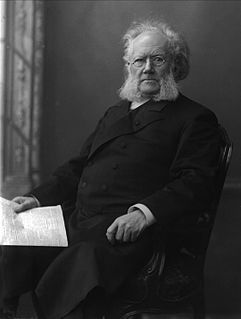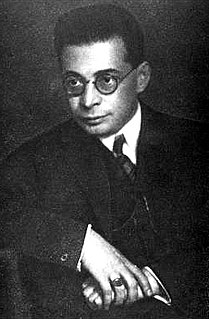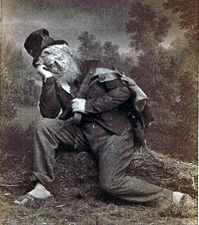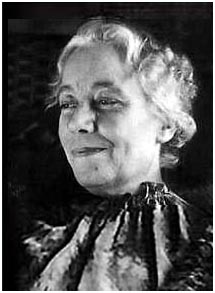
Existentialism ( or ) is a form of philosophical enquiry that explores the nature of existence by emphasizing experience of the human subject—not merely the thinking subject, but the acting, feeling, living human individual. In the view of the existentialist, the individual's starting point has been called "the existential angst", or a sense of disorientation, confusion, or anxiety in the face of an apparently meaningless or absurd world.

Henrik Johan Ibsen was a Norwegian playwright and theatre director. As one of the founders of modernism in theatre, Ibsen is often referred to as "the father of realism" and one of the most influential playwrights of his time. His major works include Brand, Peer Gynt, An Enemy of the People, Emperor and Galilean, A Doll's House, Hedda Gabler, Ghosts, The Wild Duck, When We Dead Awaken, Rosmersholm, and The Master Builder. He is the most frequently performed dramatist in the world after Shakespeare, and A Doll's House was the world's most performed play in 2006.

Otto Rank was an Austrian psychoanalyst, writer, and teacher. Born in Vienna, he was one of Sigmund Freud's closest colleagues for 20 years, a prolific writer on psychoanalytic themes, editor of the two leading analytic journals of the era, managing director of Freud's publishing house, and a creative theorist and therapist. In 1926, Rank left Vienna for Paris and, for the remainder of his life, led a successful career as a lecturer, writer, and therapist in France and the United States.

Narcissistic personality disorder (NPD) is a personality disorder characterized by a long-term pattern of exaggerated feelings of self-importance, an excessive craving for admiration, and struggles with empathy. People with NPD often spend much time daydreaming about achieving power and success, or on their appearance. This is a pattern of obsessive thoughts and unstable sense of identity, often to cope with a sub-par real life. People with the diagnosis in recent years have spoken out about its stigma in media, and possible links to abusive situations and childhood trauma. Such narcissistic behavior typically begins by early adulthood, and occurs across a broad range of situations.

Rollo Reece May was an American existential psychologist and author of the influential book Love and Will (1969). He is often associated with humanistic psychology and existentialist philosophy, and alongside Viktor Frankl, was a major proponent of existential psychotherapy. The philosopher and theologian Paul Tillich was a close friend who had a significant influence on his work.
Humanistic psychology is a psychological perspective that rose to prominence in the mid-20th century in answer to the limitations of Sigmund Freud's psychoanalytic theory and B. F. Skinner's behaviorism. With its roots running from Socrates through the Renaissance, this approach emphasizes the individual's inherent drive toward self-actualization, the process of realizing and expressing one's own capabilities and creativity.
Psychosynthesis is an approach to psychology that expands the boundaries of the field by identifying that a deeper center of identity, which is the postulate of the Self. It considers each individual unique in terms of purpose in life and places value on the exploration of human potential. The approach combines spiritual development with psychological healing by including the life journey of an individual or his unique path to self-realization.

Peer Gynt is a five-act play in verse by the Norwegian dramatist Henrik Ibsen published in 1867. Written in Danish—the common written language of Denmark and Norway in Ibsen's lifetime—it is one of the most widely performed Norwegian plays. Ibsen believed Per Gynt, the Norwegian fairy tale on which the play is loosely based, to be rooted in fact, and several of the characters are modelled after Ibsen's own family, notably his parents Knud Ibsen and Marichen Altenburg. He was also generally inspired by Peter Christen Asbjørnsen's collection of Norwegian fairy tales, published in 1845.
Logotherapy was developed by neurologist and psychiatrist Viktor Frankl, on a concept based on the premise that the primary motivational force of an individual is to find a meaning in life. Frankl describes it as "the Third Viennese School of Psychotherapy" along with Freud's psychoanalysis and Adler's individual psychology.
"In the Hall of the Mountain King" is a piece of orchestral music composed by Edvard Grieg in 1875 as incidental music for the sixth scene of act 2 in Henrik Ibsen's 1867 play Peer Gynt. It was originally part of Opus 23 but was later extracted as the final piece of Peer Gynt, Suite No. 1, Op. 46. Its easily recognizable theme has helped it attain iconic status in popular culture, where it has been arranged by many artists.

Love's Comedy is a comedy by Henrik Ibsen. It was first published on 31 December 1862. As a result of being branded an "immoral" work in the press, the Christiania Theatre would not dare to stage it at first. "The play aroused a storm of hostility," Ibsen wrote in its preface three years later, "more violent and more widespread than most books could boast of having evoked in a community the vast majority of whose members commonly regard matters of literature as being of small concern." The only person who approved of it at the time, Ibsen later said, was his wife. He revised the play in 1866, in preparation for its publication "as a Christmas book," as he put it. His decision to make it more appealing to Danish readers by removing many of its specifically Norwegian words has been taken as an early instance of the expression of his contempt for the contemporary Norwegian campaign to purge the language of its foreign influences.
Existential psychotherapy is a form of psychotherapy based on the model of human nature and experience developed by the existential tradition of European philosophy. It focuses on concepts that are universally applicable to human existence including death, freedom, responsibility, and the meaning of life. Instead of regarding human experiences such as anxiety, alienation and depression as implying the presence of mental illness, existential psychotherapy sees these experiences as natural stages in a normal process of human development and maturation. In facilitating this process of development and maturation, existential psychotherapy involves a philosophical exploration of an individual's experiences stressing the individual's freedom and responsibility to facilitate a higher degree of meaning and well-being in his or her life.
In psychology, a family nexus is a common viewpoint held and reinforced by the majority of family members regarding events in the family and relationships with the world. The term was coined by R. D. Laing, who believed that this nexus "exists only in so far as each person incarnates the nexus...maintaining his interiorization of the group unchanged".
Narcissism is the pursuit of gratification from vanity or egotistic admiration of one's idealised self image and attributes. The term originated from Greek mythology, where the young Narcissus fell in love with his own image reflected in a pool of water. Narcissism is a concept in psychoanalytic theory, which was popularly introduced in Sigmund Freud's essay On Narcissism (1914). The American Psychiatric Association has listed the classification narcissistic personality disorder in its Diagnostic and Statistical Manual of Mental Disorders (DSM) since 1968, drawing on the historical concept of megalomania.

Ludwig Binswanger was a Swiss psychiatrist and pioneer in the field of existential psychology. His parents were Robert Johann Binswanger (1850-1910) and Bertha Hasenclever (1847-1896). Robert's German-Jewish father Ludwig "Elieser" Binswanger (1820-1880) was founder, in 1857, of the "Bellevue Sanatorium" in Kreuzlingen. Robert's brother Otto Binswanger (1852-1929) was a professor of psychiatry at the University of Jena.

Peer Gynt, Op. 23, is the incidental music to Henrik Ibsen's 1867 play of the same name, written by the Norwegian composer Edvard Grieg in 1875. It premiered along with the play on 24 February 1876 in Christiania.

Karen Horney was a German psychoanalyst who practiced in the United States during her later career. Her theories questioned some traditional Freudian views. This was particularly true of her theories of sexuality and of the instinct orientation of psychoanalysis. She is credited with founding feminist psychology in response to Freud's theory of penis envy. She disagreed with Freud about inherent differences in the psychology of men and women, and she traced such differences to society and culture rather than biology. As such, she is often classified as neo-Freudian.
The concept of excessive selfishness has been recognized throughout history. The term "narcissism" is derived from the Greek mythology of Narcissus, but was only coined at the close of the nineteenth century.
Kirk J. Schneider is a psychologist and psychotherapist who has taken a leading role in the advancement of existential-humanistic therapy, and existential-integrative therapy. Schneider is also the current editor of the Journal of Humanistic Psychology. His major books are Existential-Humanistic Therapy (2010), Existential-Integrative Therapy (2008), The Handbook of Humanistic Psychology (2001), The Psychology of Existence (1995), Rediscovery of Awe (2004), Awakening to Awe (2009), and "The Polarized Mind" (2013).

Existential Psychotherapy is a book about existential psychotherapy by the American psychiatrist Irvin D. Yalom, in which the author, addressing clinical practitioners, offers a brief and pragmatic introduction to European existential philosophy, as well as to existential approaches to psychotherapy. He presents his four ultimate concerns of life—death, freedom, isolation, and meaninglessness—and discusses developmental changes, psychopathology and psychotherapeutic strategies with regard to these four concerns.











